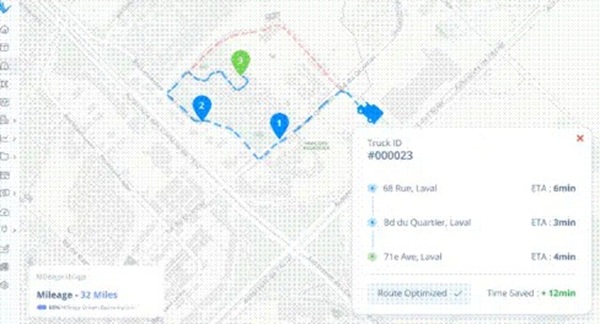By Our Reporter,The Nation
Copyright thenationonlineng

In today’s fast-paced business environment, companies that depend on transportation, logistics, or delivery operations need smarter tools to remain competitive. One such solution is routing optimization software, a technology designed to streamline delivery operations, cut unnecessary expenses, and improve customer satisfaction. Whether you’re managing a small fleet or running large-scale logistics, implementing routing optimization software can transform the way you operate.
What Is Routing Optimization Software?
At its core, routing optimization software is a digital solution that leverages advanced algorithms, traffic data, and predictive analytics to generate the most efficient routes for drivers. Unlike traditional static route planning, this software considers variables such as
● Real-time traffic conditions
● Delivery time windows
● Driver availability
● Vehicle capacity
● Fuel consumption
● Customer preferences
By accounting for these factors, businesses can save time, reduce operational costs, and achieve greater consistency in delivery performance.
Why Businesses Need Routing Optimization Software
Companies that still rely on manual route planning often face inefficiencies that hurt profitability. Using routing optimization software offers numerous benefits:
1. Reduced Fuel Costs
Fuel is one of the highest expenses in fleet operations. Optimized routes cut unnecessary mileage, directly lowering fuel consumption and reducing costs.
2. Increased Productivity
With the right software, drivers can complete more deliveries in less time. This improved efficiency enables businesses to serve more customers without expanding their fleet.
3. Improved Customer Satisfaction
Today’s customers expect fast and reliable deliveries. Routing optimization software ensures on-time arrivals and provides accurate estimated delivery times, enhancing the overall customer experience.
4. Better Resource Management
By allocating vehicles and drivers effectively, companies maximize their existing resources. This minimizes downtime, prevents overload, and ensures compliance with work-hour regulations.
5. Lower Environmental Impact
Optimized routes mean fewer emissions, aligning with sustainability goals and reducing a company’s carbon footprint.
Key Features of Routing Optimization Software
Not all solutions are the same, but leading routing optimization software often includes:
● Dynamic Route Planning: Updates routes in real-time based on traffic or unexpected delays.
● GPS Integration: Provides accurate turn-by-turn navigation to drivers.
● Analytics and Reporting: Delivers insights on route efficiency, driver performance, and cost savings.
● Multi-Stop Optimization: Plans the most efficient sequence for multiple deliveries in one trip.
● Integration with Delivery Systems: Connects with order management and customer communication tools.
These features make the software adaptable to industries like retail, distribution, e-commerce, field service, and healthcare.
Industries That Benefit from Routing Optimization Software
E-Commerce and Retail
With the rise of same-day and next-day deliveries, e-commerce retailers need precise delivery scheduling. Routing optimization software helps manage high delivery volumes while ensuring customers receive packages on time.
Food and Beverage Distribution
Perishable goods require fast, efficient deliveries. Optimized routing minimizes delays, ensuring products reach customers fresh.
Healthcare and Pharmaceuticals
Timely deliveries of medical supplies and prescriptions can be life-saving. Routing software provides reliability and compliance for sensitive deliveries.
Field Services
From plumbing to IT support, service providers benefit by reducing travel times between jobs and increasing the number of appointments completed daily.
How Routing Optimization Software Works
The technology behind routing optimization software uses a combination of artificial intelligence, machine learning, and big data analytics. The process typically involves:
Data Collection: Gathering information about delivery locations, driver schedules, vehicle types, and traffic data.
Route Calculation: Algorithms generate the most efficient path considering distance, time, and constraints.
Real-Time Adjustments: If conditions change, like a traffic jam, the software recalculates to find an alternate route.
Performance Monitoring: Managers review analytics to measure efficiency, track fuel usage, and identify areas for improvement.
Choosing the Right Routing Optimization Software
When selecting a solution, businesses should consider:
● Scalability: Can it handle both small and large fleets?
● Ease of Use: Is the interface user-friendly for drivers and dispatchers?
● Integration: Does it connect with existing systems like order management or inventory software?
● Support and Training: Does the provider offer onboarding and technical assistance?
● Cost vs. ROI: Will the savings outweigh the investment in the long run?
The Future of Routing Optimization Software
With advancements in AI, IoT, and autonomous vehicles, routing optimization software will only become more powerful. Businesses can expect even smarter predictive tools that anticipate demand, automate scheduling, and further reduce human error. Companies investing in this technology now will have a strong competitive advantage in the future.
Efficiency is the backbone of successful delivery and logistics operations. By integrating routing optimization software, businesses can save costs, boost productivity, and meet growing customer demands with precision. For organizations ready to embrace modern logistics solutions, adopting routing optimization software is not just a choice; it’s a necessity. With Cigo Tracker, companies gain a trusted partner in optimizing routes, streamlining operations, and driving long-term success.



